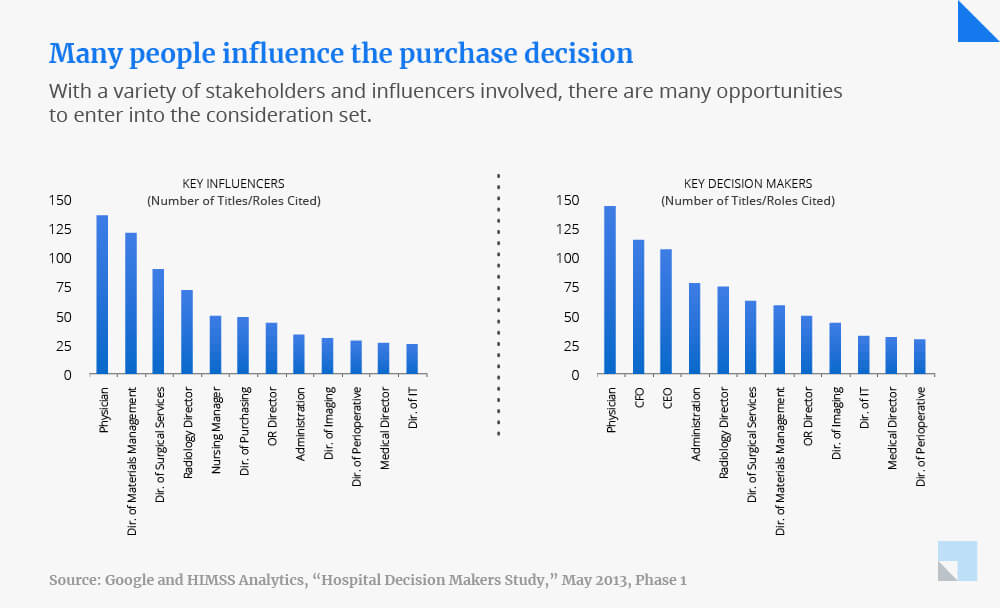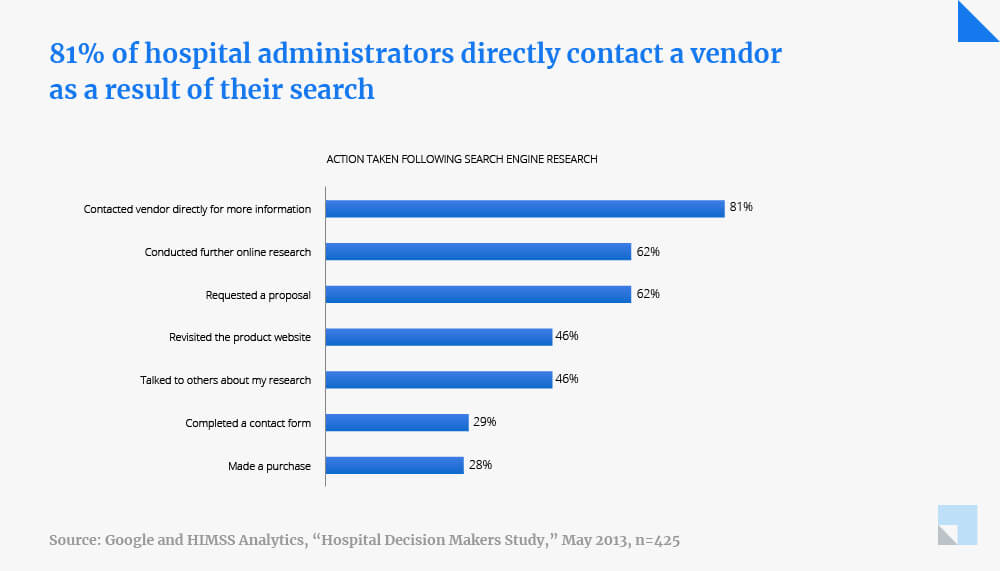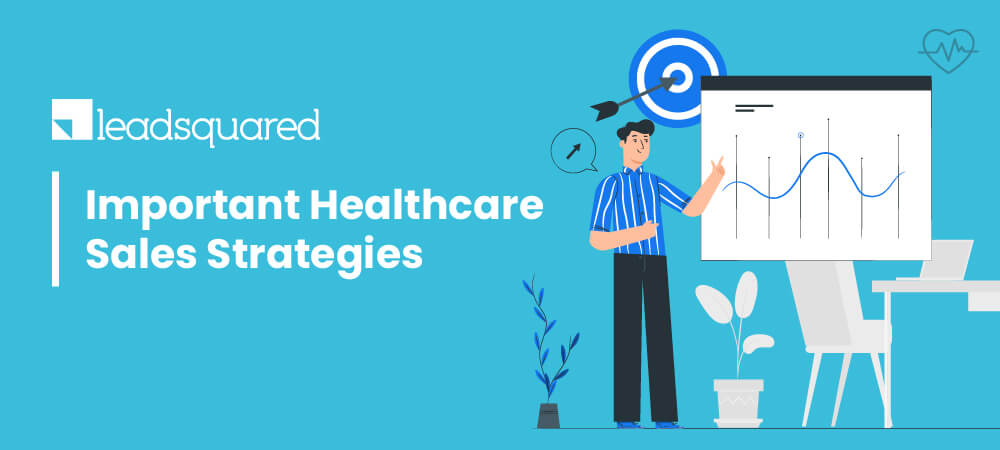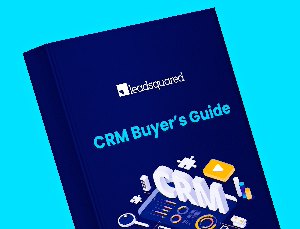Healthcare sales strategies are a bit different than strategies for selling say, a consumer product. The healthcare industry is constantly changing, and you need to adapt your sales strategies for the best results. In this post, we will explore the best healthcare sales strategies that can propel your business towards a trajectory of growth.
So, here is the first and one of the most vital strategies.
Know Your Customer’s Purchasing Hierarchy
Selling to healthcare cannot rely on a “one-size-fits-all” process. Every client you come across has a different buying process. For instance, you need to interact with only one decision-maker when you are selling to a clinic or doctor’s office. On the other hand, selling to a hospital will mean convincing several people.
According to Google Think Insights, most healthcare sales involves various decision-makers like doctors, CEOs, CFOs, administration, IT team, medical directors, and more.

It’s crucial that you learn your healthcare buyer’s organization chart to know about all the decision-makers in the buying process. You can work out the purchasing hierarchy by talking to your existing contacts and sourcing information from your inter-organizational network.
It can also be helpful to check out platforms like LinkedIn for organizational hierarchies.
Serve Your Customer’s Customer
Businesses in healthcare may not always serve directly to the end customer. The pharmaceuticals or medical equipment you sell to a hospital will ultimately serve the patients and not the doctors.
The trick to land sales in healthcare is to focus on your customer’s customers. A doctor or hospital is more likely to buy your product if you can make their patients’ lives easier. So, focus on the patients and try to align the benefits of your product with patient needs while you give your sales pitch.
This method really works, as 42% healthcare organizations make buying decisions based on user requests.
Take Your Brand to Doctors
This is an old technique that still works today. You need to take your brand to doctors and specialists so that they can help sell your product. Obviously, as we said above, you need a product that fulfills patient needs.
While you pitch, stop relying on traditional resources like brochures or flyers. Arm your sales reps with mobiles and tablets to take advantage of visual presentations that create more appeal. You can show your clients relevant videos and give a walkthrough of how your product makes patients happier.
According to Google Think Insights, mobile devices and videos are key factors that influence healthcare administrators.
Create an Online Presence
A professional and well-built website is a must to sell your healthcare products. Do you know why?
Here are some reasons from the Think Insights report we cited above-
- More than 50% healthcare administrators research vendors and products online
- 94% use the internet to research product features
- 90% identify vendors on the web
- 82% compare products online
- 81% decision-makers directly contact a vendor after an online search

Unless you have a website, you will obviously miss out on a huge selling potential. So go ahead and build a solid website with good content that helps customers know more about your offerings.
Invest in PPC Ads
PPC ads will help you capitalize on searches people conduct on Google and other search engines. You can display your ad on top of the search engine results and drive more traffic to your website or landing page for conversion. You can also check out our article on healthcare marketing strategies that talk in detail about all the digital channels.
While you plan your campaign, dedicate a bit of budget for Facebook and LinkedIn advertising. You can even advertise on healthcare platforms like WebMD, which is used by 71% of patients and providers as their primary source of health information.
If you are an individual practitioner, you might want to target local customers with your PPC ads. Most of your patients will come from your locality, so it makes sense to target that market.

Be a Product Expert
Healthcare buyers are now more informed thanks to the internet. You saw a little while ago how healthcare administrators research and study products online. As a result, it’s not enough just to know about the benefits of your products or give a gist of your offering to a client.
Healthcare decision-makers will ask very specific questions about your product that you must be able to answer in order to close the deal. It’s not enough just to know the benefits of a product; you also need to know how it works, how it can help patients, and how it can ensure profitability for your client.
You should stay on top of the latest news and industry publications to become a subject matter expert. Your confidence and knowledge will help you convince your client and close the deal successfully.
Track Your Performance
Whatever strategy you adopt, it’s really crucial to track the numbers and figures. You need to measure the effectiveness of each strategy and whether it leads to an increase in sales.
Refine or scrap a strategy if it fails to bring results while replicating those that work. You should also analyze your customer and sales data to form insights and make better sales strategies.
The best is to use a HIPAA compliant CRM to track your leads, sales, and customers from a single interface.
Arm Your Sales Reps with Mobile CRM
Want to increase the efficiency of your sales reps?
Then consider empowering them with a mobile CRM to build a super productive sales team. You can track and manage your sales activities and know what is going on in the field.
A mobile CRM also helps your reps to manage their day efficiently. They can access all leads with address and location and keep track of their meetings. The CRM also suggests potential upselling and cross-selling deals automatically to your reps based on customer history. Consider going for a reputed field CRM like LeadSquared for the best results.
FAQs
Here are some guidelines for healthcare sales reps to build strong relationships with providers while being ethical and compliant:
Be transparent: Disclose any potential conflicts of interest, and avoid any activities that could be perceived as influencing medical decision-making. This includes providing gifts or entertainment of excessive value, or making misleading or unsubstantiated claims about your products or services.
Provide value: Focus on educating healthcare providers about your products or services in a way that is relevant to their practice and their patients’ needs. Be prepared to answer their questions and provide them with evidence-based information.
Respect their time: Be mindful of healthcare providers’ busy schedules and avoid making excessive demands on their time. Schedule appointments in advance and be prompt for meetings.
Build trust: Be honest and reliable in your interactions with healthcare providers. Follow through on your commitments and be responsive to their needs.
You can track a combination of activity metrics and performance metrics to gauge their effectiveness.
Activity Metrics:
Number of calls made: Measures the rep’s effort in reaching out to potential customers.
Number of meetings held: Indicates the success in scheduling and attending meetings with decision-makers.
Number of proposals submitted: Tracks the ability to convert interest into concrete proposals.
Time spent on different activities: Helps understand how the rep allocates time between selling, administrative tasks, and training.
Performance Metrics:
Quota attainment: The percentage of assigned sales targets achieved.
Average deal size: Measures the revenue generated per successful sale.
Win rate: The percentage of proposals that convert into closed deals.
Customer acquisition cost (CAC): Tracks the cost associated with acquiring a new customer.
Sales cycle length: Measures the average time taken to close a deal.
Customer retention rate: Tracks the ability to maintain existing customer relationships.
Additional Considerations:
Industry-specific metrics: Depending on the specific healthcare product or service, tracking additional metrics like product adoption rate or patient satisfaction might be relevant.
Customer satisfaction metrics: Metrics like Net Promoter Score (NPS) can assess customer experience and loyalty.
Market share: Tracks the percentage of the total market captured by the company’s products or services.
By tracking these metrics, healthcare sales representatives can gain valuable insights into their strengths and weaknesses, identify areas for improvement, and ultimately improve their overall effectiveness in achieving sales goals. Additionally, it helps sales managers coach and support their teams more effectively.










